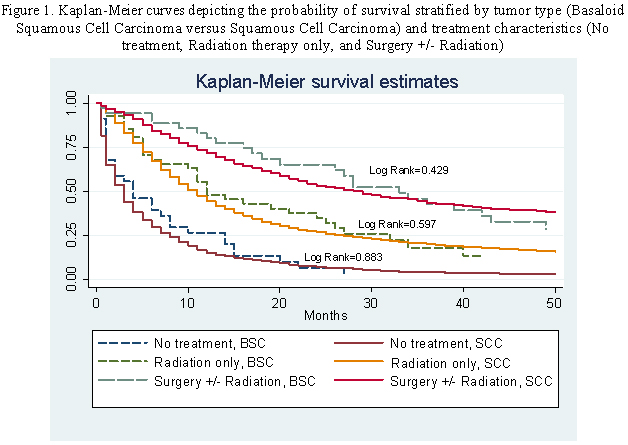Comparative analysis of clinical, treatment and survival characteristics of Basaloid and Squamous Cell Carcinoma of the Esophagus
*Aitua Salami1, *Abbas E Abbas2, *Nirag Jhala3, *Charles T Bakhos1,2
1Department of Surgery, Albert Einstein Medical Center, Philadelphia, PA;2Department of Thoracic Medicine and Surgery, Temple University Hospital, Philadelphia, PA;3Department of Pathology, Temple University Hospital, Philadelphia, PA
Objective: Basaloid squamous cell carcinoma (BSC) is a rare variant of squamous cell carcinoma (SCC) of the esophagus. Even though pathologically thought to be more aggressive than SCC, there is discrepancy in the literature regarding the outcomes of BSC compared to SCC.
Design: Retrospective cohort study
Setting: SEER database (2000-2013)
Patients: Patients with a histologic diagnosis of BSC and SCC
Interventions: None
Main Outcome Measures: Treatment and survival characteristics of patients with SCC and BSC
Results: 16,158 patients were included in this study [173 patients (1.1%) had BSC]. There were no significant differences between the 2 groups based on age, gender, marital status, insurance, or geographic region of diagnosis, but patients with BSC were more likely to be Caucasian (73.4% vs. 64.7%; p=0.017). Among staged patients, baseline tumor stage was similar between both groups; however, BSC tumors were more likely to be of high pathological grade [56.8% vs. 38.2%; p<0.001]. Patients with SCC were more likely to receive radiation therapy (36.9% vs. 53.9%; p<0.001), while patients with BSC were more likely to undergo resection (32.4% vs. 17.0%; p<0.001). Median overall survival was similar between both groups (14 vs. 9 months; Log Rank=0.144), and this relationship persisted following stratification by treatment (Figure 1)
Conclusions: Even though more likely to be poorly differentiated at presentation, BSC of the esophagus seems to have similar clinical features and survival outcomes when compared to SCC. Patients with BSC and SCC should undergo stage-specific treatment to achieve optimal outcomes 
Back to 2017 Posters
